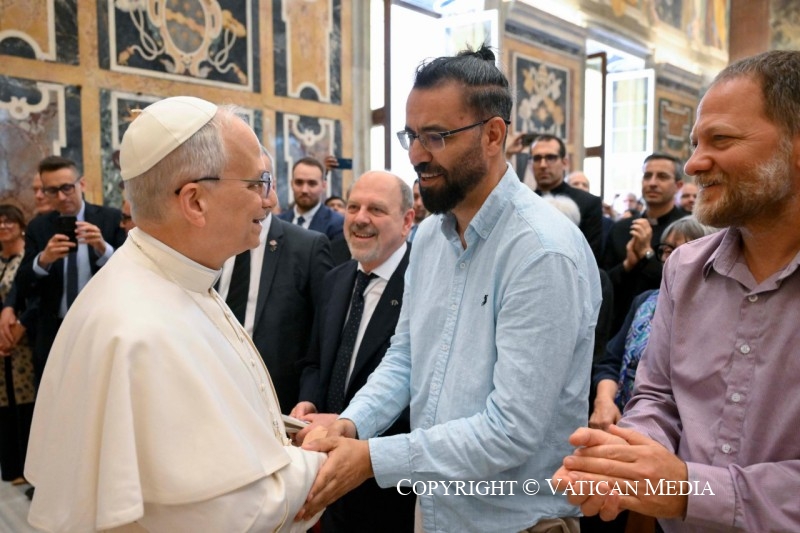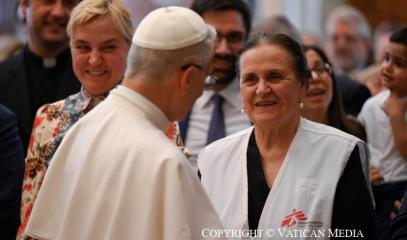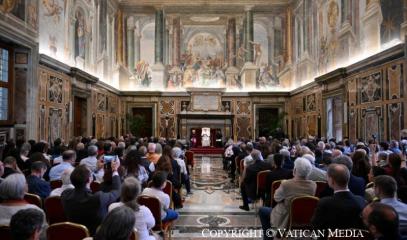Leo XIV: peace begins ‘by standing alongside victims’
Pope Leo XIV spoke to 300 representatives of movements and associations dedicated to peace, telling them to “generate hope”. The pontiff cited his predecessor who promoted the 2024 Arena of Peace, an event marked by the embrace between Maoz Inon, an Israeli, and Aziz Abu Sarah, a Palestinian, who were also present today. The path to peace “involves everyone”, from the top and “from below”. This is possible when differences are “acknowledged, understood and surmounted.”
Vatican City (AsiaNews) – The "courageous" embrace between Maoz Inon, an Israeli whose "parents were killed by Hamas", and Aziz Abu Sarah, a Palestinian whose "brother was killed by the Israeli army", was the highlight of the Arena of Peace meeting on 18 May 2024 in the Italian city of Verona, which saw the participation of Pope Francis.
Today, Pope Leo XIV remembered that “bridge” between two peoples still tragically in conflict, meeting in the Vatican with approximately 300 delegates, representatives of associations and movements dedicated to peace, who inspired that initiative. Mediterranea Human Saving, Doctors Without Borders, and Amnesty are among the organisations present.
“That gesture remains as a testimony and sign of hope,” Leo said in the Clementine Hall in the Apostolic Palace. “We thank them for being here today.”
“On that occasion, the Pope stated once again that building peace starts by standing alongside victims and seeing things from their point of view,” Leo explained, citing his predecessor who spoke in the evocative setting of the Roman amphitheatre in Verona’s city centre.
“This approach is essential for disarming hearts, approaches and mentalities, and for denouncing the injustices of a system that kills and is based on the throwaway culture.”
A year ago, Francis said: “Let us remember that ideologies do not have feet to walk, they do not have hands to heal wounds, they do not have eyes to see the suffering of others. Peace is made with the feet, hands and eyes of the people who are engaged, all together.”
Such a commitment is not only “in the hands of great leaders”, but comes “from below,” as Pope Leo noted today.
Last year the Diocese of Verona promoted the event, Arena of Peace, together with Combonian missionaries, a congregation that also operates in Asia. Today's audience was meant to promote that event again, "confirming [Verona's] tradition as a place to advance and develop [the Church’s] social doctrine", the local diocese says on its webpage.
Attention to this last aspect is a priority for the new pope since the start of his pontificate, as the choice of the papal name indicates, inspired by Leo XIII, author of the first social encyclical of the Church, Rerum Novarum (1891).
“The Gospel and the Church’s social doctrine are a constant source of support for Christians in this effort,” while the commitment to peace “demands hearts and minds trained in concern for others and capable of perceiving the common good in today’s world.”
This context is certainly marked by inhuman violence, like in Gaza. Peace “involves everyone, and leads to the fostering of right relationships between all living beings”.
Pope Leo also quoted John Paul II who, in the social encyclical Sollicitudo rei socialis of 1987, underlined how “peace is an indivisible good; it is either everyone’s or no one’s.”
Making it happen means supporting slowness in an era “marked by speed and immediacy”. Indeed, “[W]e need to recover the patience required for this process to occur,” but also consider reality, which is made up of “places, communities and local institutions”, and by listening.
“[P]eace is possible when disagreements and the conflicts they entail are not set aside, but acknowledged, understood and surmounted.”
Addressing the members of the grassroots movements and associations, the Holy Father stressed the “valuable” commitment, characterised by “dialogue with all parties”, “creativity” and “ingenuity”, which express a “culture of peace".
“Through concrete action ‘from below’, in dialogue with all parties and with the creativity and ingenuity born of a culture of peace, you are pursuing projects and activities at the concrete service of individuals and the common good. In this way, you generate hope.”
Such a culture stems from bearing “witness” to a “non-violent” lifestyle, both globally and locally. “[W]henever those who have suffered injustice and violence resist the temptation to seek revenge, they become the most credible agents of non-violent peacebuilding processes.”
“If you want peace, prepare institutions of peace,” Leo said to summarise the commitment to a “disarmed” world, which must be taken up not only by political parties, but also by “educational, economic and social” institutions.
Remembering that “we” all bear responsibility, as noted many times in Pope Francis’s encyclical Fratelli Tutti, “I encourage you to remain committed and present: present within history as a leaven of unity, communion and fraternity”.
Ultimately, “Fraternity needs to be recovered, loved, experienced, proclaimed and witnessed, in the confident hope that it is indeed possible, thanks to the love of God”.
27/10/2023 15:23









.png)










